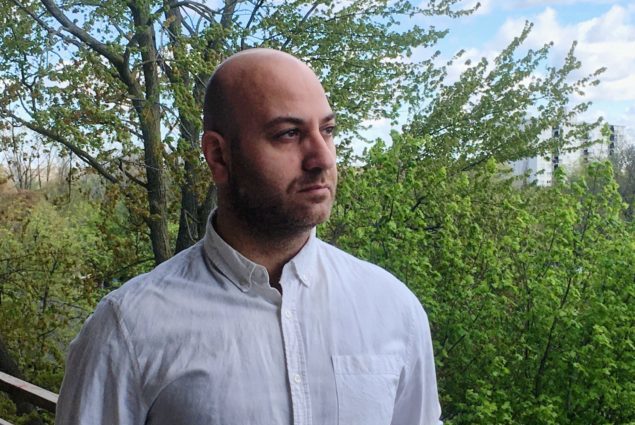From Teaching to Learning: A Refugee’s Story of Resilience
Friday | May 21, 2021 | by Marcia Barroso

Ninos Ishaia and his wife Nancy are just two of the 6.6 million Syrians that left their country to escape its civil war. Before coming to Ontario, Canada, the couple had lived for more than two years in Lebanon. Five years have passed since Ninos joined more than 70,000 Syrian refugees who settled in Canada, but he vividly remembers the fears that came with the transition.
“I arrived in January 2016, thinking that my biggest challenges were the feeling of uncertainty of what was about to come and how to find a job where I could employ my skills,” he recalls.
In Syria, Ninos taught English in high school. He holds a bachelor’s degree in English language and literature from the University of Aleppo and a higher diploma in education (which is required in order to teach in private and public schools in Syria).
If he wanted to pursue a similar career in Canada, Ninos needed to have those credentials assessed. He needed to find out if they were equivalent to the credentials required to teach English in Canada. (And if not, what other educational requirements would he need to fulfill?)
But in order to have his academic documents assessed, he would need to get them from Syria. This was a requirement that Ninos called “an absolutely impossible mission.”
“The Ministry of Higher Education in Syria required that I officially authorize a Syrian citizen who knew me personally to get the original copy of my documents from the University of Aleppo and have them signed, sealed, and sent to Canada. The main problem was that I did not have any relatives, friends, or acquaintances left in Syria to help me,” he says. “So, in the absence of any family members or friends who knew me, it was impossible to move any step forward towards that goal.”
Learning About Refugee Programs in Canada
But Ninos was not willing to give up just yet. During a visit to Ontario’s North Park Community Church, he learned about a recently launched pilot project that assessed the credentials of refugees whose situations precluded them from accessing their academic documents back in the countries from which they had fled.
That pilot project developed into what is now known as the WES Gateway Program, an initiative that has helped more than 1,000 immigrants who are forcibly displaced from their country to pursue their career or education goals in Canada. Ninos would eventually become one of them. The WES Gateway Program would bring his “impossible” situation within reach.
“Long before receiving my evaluated credentials, I started to feel more empowered and confident just by receiving the attention and support from WES,” Ninos says. “For me, the WES Gateway Program encourages professional development and allows success. It also represents a tap on my shoulder embodying the welcoming Canadian spirit of unwavering and unlimited assistance, of walking the extra mile to help me.”
Embracing New Opportunities
Even with his credential equivalencies assessed through the WES Gateway Program, Ninos needed to complete local certification in order to teach in Canada. After doing some research, he learned about the Teaching English to Speakers of Other Languages and Intercultural Competence Graduate Certificate program at Fanshawe College.
During the application process, he learned that Fanshawe requires internationally educated applicants to submit an assessment of their previous academic records. Thankfully, Ninos already had his evaluation from the WES Gateway Program and was able to provide it without starting from the beginning of the process.
To pursue his studies, Ninos resigned from the job he had been working for four years, which he had accepted in order to make ends meet for his family upon arriving in Canada. In the fall of 2020, Ninos started his teaching certification program at Fanshawe College.
“I was very happy to have [my report] accepted by both of the competitive higher education institutions that I applied to, and I aspire to become a certified English teacher soon.”
Looking Towards the Future
After finishing the program, Ninos will be eligible to apply for the Teachers of English as a Second Language (TESL) certification. Once he receives it, he will be able to pursue work in his chosen field, which will make good use of his professional experience, knowledge, and skill set.
“I have recently completed my studies, and I was awarded the President’s Honour Roll and the Dean’s Honour Roll for both terms: Fall 2020 and Winter 2021. Currently, I’m under the ‘recommended for graduation’ status,” he says.
Until then, Ninos decided to reach out to his former employer, asking if he could get his old job back. He says: “I contacted my employer expressing my intentions to return, and they welcomed it. I have been back at work for a week now, and I’m glad I’ve been able to secure employment immediately until I find a job in my field of interest and study.”
As this chapter of his story grows closer to a happy end, Ninos looks back and reflects on his unique journey.
“My wife and I have been supporting each other in this journey, and multiple factors have enabled us to keep going,” he says. “The most is our faith in knowing that this country celebrates hard work, appreciates success, and facilitates access to equal opportunities.”
Ninos’ Advice for Newcomers
- If possible, learn about the WES credential evaluation process and required documents to submit your application.
- In my opinion, having the authentic and original papers and ratified and certified copies facilitates the process.
- If you already left your country, make sure you have some proof of your academic achievements.
- Connect with people and organizations that can assist you every step of the way with information about different aspects of living in Canada.
